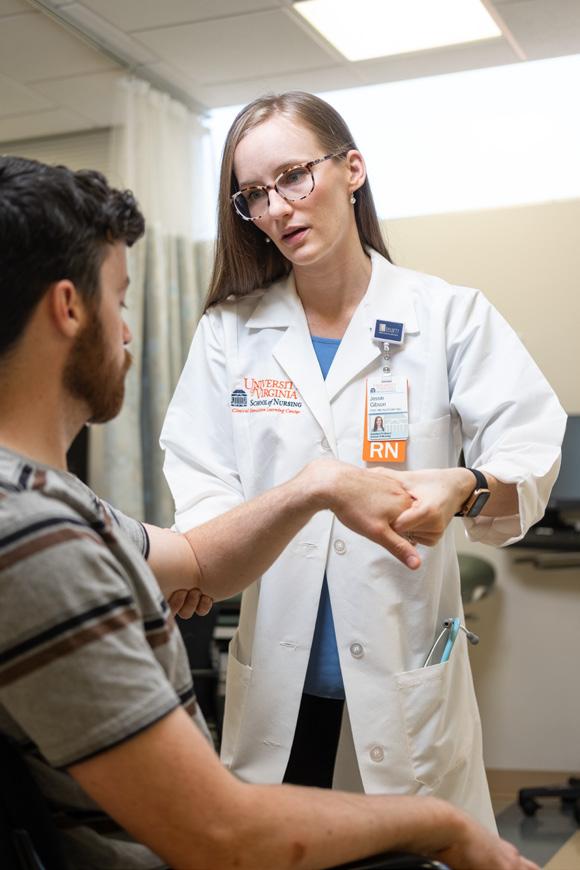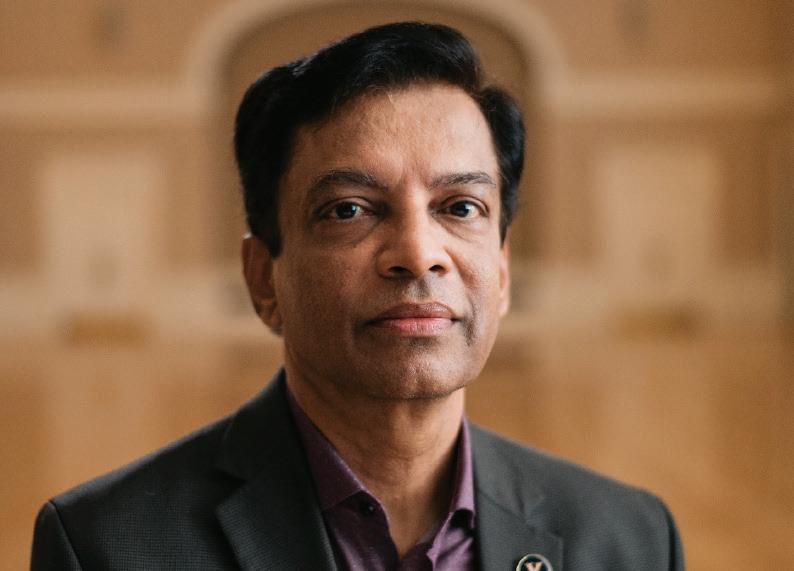2023 ANNUAL RESEARCH REPORT

























I am delighted to present the annual report for the Office of the Vice President for Research (VPR) at the University of Virginia. As we reflect on the accomplishments and progress of fiscal year 2022-2023, I am filled with immense pride and gratitude for the tireless efforts of our dedicated researchers, scholars, and staff. At the heart of our mission lies a commitment to advancing knowledge and serving society on a local, national, and global scale through research, scholarship, creative arts, and innovation. We are driven by the pursuit of discoveries that enrich and improve lives, and this year has been no exception.

I am thrilled to announce that our research enterprise has experienced remarkable growth, reporting a record $532 Million in sponsored awards during the fiscal year, representing a phenomenal increase of over 22% compared to the previous year. This success is a testament to the dedication, creativity, and collaborative spirit of the UVA research community.
We remain steadfast in our commitment to support and invest in our researchers and infrastructure. Our five research themes—Democracy, Environmental Resiliency and Sustainability, Brain & Neuroscience, Precision Medicine/Health, and Digital Technology and Society—continue to thrive as we nurture their development and explore new frontiers.
Last year, we made strategic investments of $50M in each of the first three themes, and I am pleased to share that this year we expanded our efforts by making further investments of similar magnitude in the last two strategic areas. These investments will not only bolster our research capabilities but also attract top talent, enabling us to make even greater strides in these critical fields.
In line with our dedication to fostering innovation, I am delighted to announce that we launched the Paul and Diane Manning Institute of Biotechnology. This exciting initiative will focus on pioneering cellular, gene, and immunotherapies, while also serving as a hub for new business ventures. Moreover, we are excitedly anticipating the construction of a state-of-the-art lab building at Fontaine Research Park, scheduled to begin in 2024, which will further enhance our research capabilities.
As we move forward, we are determined to maintain our upward trajectory, nurturing a thriving research ecosystem that enables our faculty and staff to push boundaries and make transformative discoveries. I extend my heartfelt gratitude to all those who have contributed to this remarkable success, and I invite you to explore the achievements and breakthroughs detailed in this annual report. It is an exciting time to be a part of the research endeavors at UVA, and together we are making a lasting impact, not only within our institution but also across the Commonwealth of Virginia, the nation, and the world.
Sincerely,
63%
Funding increase FY16 - FY23

The VPR office is an important resource and helps to advance UVA research through every step in the process—everything from finding funding, applying for grants, doing human subject or animal research, making sure labs are safe and in compliance with both ethics and policies to launching new ventures, patents for inventions and communicating their research to the world.
SEED FUNDING
• 3Cavaliers
• P2PE STEM
• Grand Challenges
• Pan-U Institutes
• SIF Projects
• School & Central Seed Funds
• Venture Fund
• Licensing & Ventures Seed Fund
OPERATIONAL EXCELLENCE
• Human Subject Protection Program
• Center for Comparative Medicine
• Animal Care & Use
• Environmental Health & Safety
• Radiation Safety
• Export Controls
• Sponsored Programs
• Data Security
• Foreign Influence
• Licensing & Ventures
• Creation of Large & Complex Proposals
• Award Nominations
• Coordinate with State & Federal Agencies
• Limited Submissions
• Data Analytics
IMPACT & COMMUNICATE
• Sponsored Research
• Philanthropic Support
• Quantity & Quality of Publications
• Faculty Recognition
• National Academy Members
• Translation of Discovery & Knowledge
• Research-enabled Student outcomes
• Peer recognition (Ranking)
The Office of Sponsored Programs supports faculty members, assisting them with their grant proposals, budgets, processing, and review. Our growing Research Development team is here to help researchers prepare large scale grant proposals. Seed funding initiatives like 3Cavaliers, P2PE, and more help faculty get new research projects off the ground and provide the data they need to apply for larger grants.
Our office works with faculty and staff to improve UVA’s overall effectiveness and experise in research administration. As an alum who feels a great passion for UVA, I can think of no better place and time to be in research administration.


- Stewart Craig, Executive Director, Office of Sponsored Programs

Environmental Health and Safety helps keep UVA labs safe and compliant. The Human Research Protection Program, Office of Animal Welfare, Animal Care & Use Committee, and Center for Comparative Medicine all make sure that research at UVA is done ethically, protects participants, monitors animal care, follows policies, and is compliant with all regulations.
Our daughter Violet is the beneficiary of translational research and alive today because of clinical trials. This is more than a job. It’s a lifelong passion.
- Raphael “Ralph” Malbrue Executive Director & Attending Veterinarian, Center for ComparativeMedicine
Licensing & Ventures Group takes the best faculty ideas and helps to turn them into companies, patents and more.
The entire LVG Team derives its energy and enthusiasm from working with UVA faculty, students, entrepreneurs and investors.
- Richard W. Chylla, Executive Director, Licensing & Ventures GroupWith an engineering school and medical school close by, many innovative and collaborative centers and institutes have sprung up around Grounds. UVA currently has more than 150 externally funded projects that include an investigator in more than one school, bringing new prospectives and fresh approaches to solving problems.

16 faculty across two schools awarded a $12M grant from NIH to form SASCO, the Systems Analysis of Stress-adapted Cancer Organelles Center at UVA to study interactions of organelles as a network instead of focusing on specific genes or proteins.
ARTS & SCIENCES + MEDICINE
New discovery led by Chemistry, and partnering with microbiology, that could provide a window into the complex relationship between our bodies and the community of microbes known as our microbiome and lead to new treatments for a variety of diseases.

COASTAL COMMUNITIES TO COMBAT CLIMATE CHANGE
A joint project to find methods to build collaboration between researchers and coastal area residents and help urban and suburban communities facing climate change challenges to achieve a more resilient future.

A joint project combining psychology and data science to investigate if and how psychological traits and political identity can be used to predict susceptibility to COVID-19 misinformation.

UVA & CHILE:
PARTNERSHIP WITH CHILE TO BUILD LEADINGEDGE INSTRUMENTS
UVA astronomers are working with Chileans to build a new, state-of-theart infrared spectrograph called APOGEE-2 to survey southern half of Milky Way.

UVA & NETHERLANDS:
GENE DATA IDENTIFIES CANDIDATE GENES FOR NEW GENOME-WIDE ASSOCIATION STUDIES (GWAS)
A UVA Engineer is leading an international team in using big data analytics to explore the variations in disease susceptibility between men and women.

UVA & BANGLADESH:
GLOBAL NETWORK FOR WOMEN’S AND CHILDREN’S HEALTH NETWORK
UVA researchers are conducting clinical trials by pairing foreign and U.S. investigators to improve maternal and child health while simultaneously building local research capacity and infrastructure.

Collaboration off Grounds connects UVA research to the nation and the globe.Photo courtesy UVAToday Photo courtesy Civelek Lab Photo courtesy UVAToday
Neuroscience researchers led by John Lukens discovered that a molecule in the brain is responsible for orchestrating the immune system’s responses to Alzheimer’s disease and multiple sclerosis, potentially allowing doctors to supercharge the body’s ability to fight devasting neurological diseases. The molecule directs immune cells called microglia to remove plaque buildup associated with Alzheimer’s and prevent the debris buildup that causes MS.



More than 50 percent of the largest lakes in the world are losing water, according to a new assessment published in Science by a group led by Fangfang Yao, and the key culprits are a warming climate and unsustainable human consumption. By tracking lake water storage trends and the reasons behind them with satellites, scientists can give water managers and communities insight into how to better protect critical sources of water and important regional ecosystems.



An algorithm developed by cancer center researchers led by Kristen Naegle offers a new and better way to pinpoint patients who will benefit from powerful cancer drugs called kinase inhibitors, an important step forward in precision medicine tailored to the individual. The algorithm, described in an article for Nature, performs better than existing approaches, and is more applicable to understanding a patient’s cancer.
Researchers led by Sen Zhang are using electrolysis, using a plentiful renewable energy source such as solar energy, to create hydrogen at an industrial scale. This process is a potential answer to two of the world’s most vexing problems: high energy demand and climate change, and is part of the current administration’s “Earthshot” challenge to move the nation to net-zero carbon emissions by 2050.




Trans-Omics for Precision Medicine (the TOPMed program) led by Stephen Rich, has analyzed the entire genetic makeup of more than 53,000 people of diverse backgrounds on different continents. Most of the people are from minority groups, which have been historically underrepresented in genetic studies. The increased representation should translate into a better understanding of how heart, lung, blood and sleep disorders affect minorities and help reduce longstanding health disparities.

A team led by Liheng Cai has published a study about a class of materials called associative polymers that challenges a long-held understanding of how the materials, which have unique self-healing and flow properties, function at the molecular level. The finding has implications on how these materials are used for creating everything from recyclable plastics to human tissue engineering.



Researchers led by Mariano Garcia-Blanco have identified a series of processes in cells that suppress the risk of developing multiple sclerosis. They found a gene that acts as a master controller for many other genes important in our susceptibility to MS and the proper functioning of our immune systems, and this discovery could lead to better prevention and treatment therapies.
- Josh Barney
Craig Volden headed a study on whether effective lawmakers in the US Congress receive electoral payoffs of their efforts. Are effective lawmakers better at warding off challengers in the next election? Do they win at a greater rate? To answer these questions, they drew on original data on congressional primary elections from 1980 to 2016, focusing on elections that lack partisan cues and where voters tend to be highly knowledgeable about politics.
















One of the goals of the strategic plan for the university is for UVA to become the best public university by 2030. One of the key pillars of the plan is enabling “discoveries that enrich and improve lives.” The five strategic research areas outlined in the plan are Democracy, Environmental Resiliency and



, Brain & Neuroscience, Precision Medicine/Health, and Digital Technology and Society. Within these areas, the VPR is focused on moving the university from prominence to preeminence through seed funding, strategic hires, investments in infrastructure, and more.



Grand Challenges are large strategic research investments identified in the 2030 plan intended to have a significant impact on the five research priority areas. In 2022 and 2023, $50M in seed funding was given to each of the areas to expand research.
SRII is developing a prioritized list of infrastructure investments to strengthen UVA’s research enterprise. A steering committee and 9 working groups comprised of faculty and staff examined every aspect of UVA’s current infrastructure, identifying places that need to expand and develop in order to promote growth for research.
3Cavaliers is a program that awards seed funding to collaborative research projects with 3 faculty members from different schools and departments. 3Cavaliers 2.0, 57 projects with 171 faculty from across Grounds, successfully completed a second round of projects in May 2023.

We invested $19M in the Prominence-to-Preeminence (P2PE) STEM Targeted Initiatives Fund. The goal is to contribute knowledge to address major societal challenges and opportunities and move University efforts from prominence to preeminence in the five research focus areas.
Pan-University Institutes develop innovative and comprehensive approaches to solving major global challenges, bringing faculty, researchers, and staff together from across schools and disciplines for cross-disciplinary or trans-disciplinary research.
A research institute whose transdisciplinary teams and novel structure reflects the interwoven systems they study.
Dedicated to the study and strengthening of Democracy.
The UVA Brain Institute builds and sustains interdisciplinary neuroscience research teams across Grounds to address major societal challenges.

Supports interdisciplinary research and training that is both great and good at the intersection of climate change and human well-being.
Promotes collaborative science and establishes a state-of-the-art campus centered on research, development, commercialization, manufacturing, and patient care of new, innovative cellular, gene, and immuno-therapies.
Photo courtesy UVA CommunicationsOur faculty at UVA are some of the best in the world. Every year, they win top prizes, teaching awards, and bring in hundreds of millions of dollars in sponsored funding.
AMERICAN ACADEMY OF ARTS & SCIENCES
Danielle Citron
Law
COTTRELL SCHOLAR

Ilse Cleeves
Arts & Sciences
HOWARD HUGHES MEDICAL INSTITUTE
Jochen Zimmer


Medicine
GUGGENHEIM FELLOWSHIPS



Arts & Sciences
NSF CAREER AWARDS IN 2022
MOORE INVENTOR FELLOW

Rebecca Pompano
Arts & Sciences
NATIONAL ACADEMY OF SCIENCE
Ed Egelman
Medicine
ROME PRIZE
Michael Lee
Architecture
NATIONAL ACADEMY OF INVENTORS
Engineering

The Research Achievement Awards are held every January to celebrate our top researchers. Awards are presented to faculty who are making an impact in their field and are acknowledged as leaders in their field.



